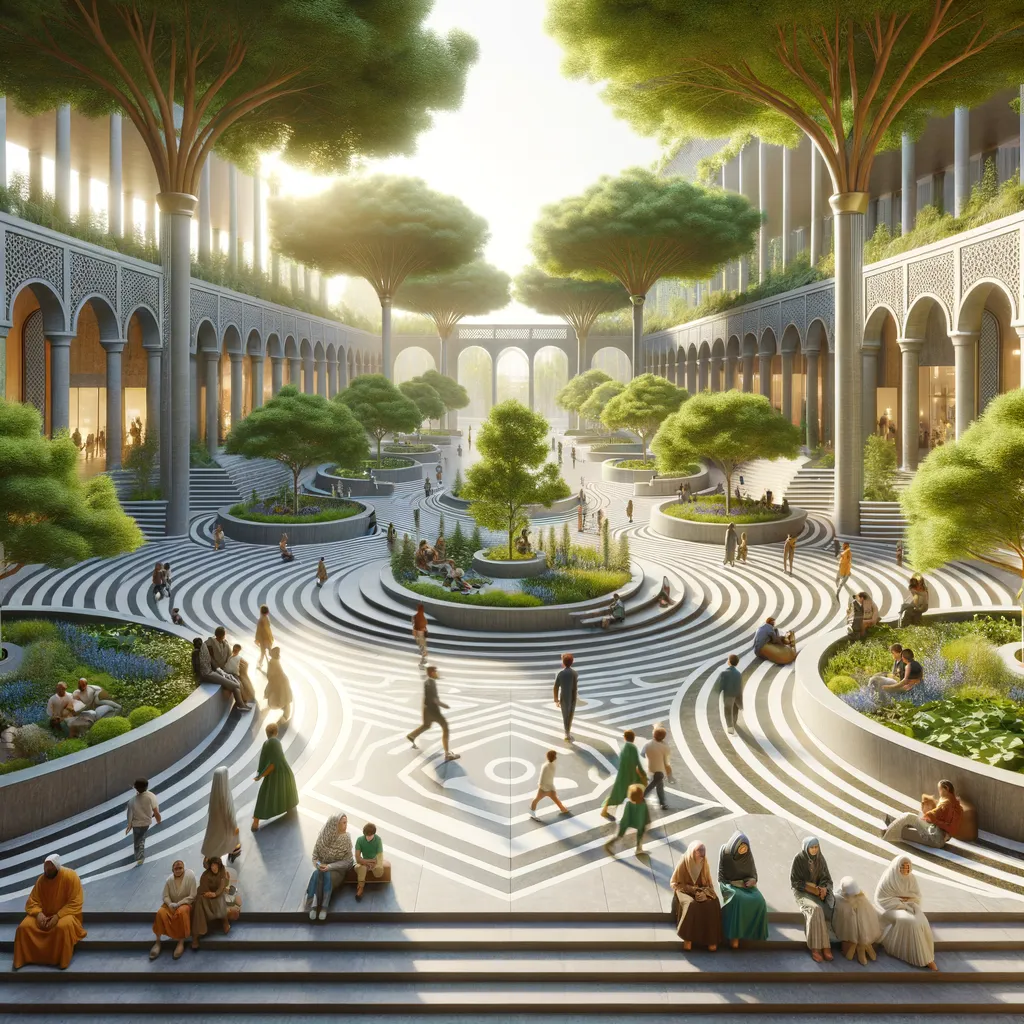Title: Exploring the Ancient Echoes: How Past Civilizations Shape Modern Outdoor Living
—
Welcome to a fascinating journey where the echoes of ancient civilizations blend into the canvas of our modern outdoor living spaces. As we dive into the past, we uncover the timeless influences that continue to shape our gardens, parks, and recreational areas, making our connection to nature more meaningful. Interested in enhancing your Outdoor experience? Discover the best gear and tips at Collins Camping and Outdoors. And if you’re on the lookout for the ultimate Camp places to test your new knowledge, Adventure Nation has got you covered.
The great civilizations of history – from the lush gardens of Babylon to the serene paths of Japanese Zen gardens – have left an indelible mark on how we design, perceive, and interact with our outdoor environments today. This guide aims to enlighten parents on the profound impacts these ancient traditions have on our modern lives, providing insights and inspirations to cultivate spaces that not only reflect beauty and tranquility but also foster a deeper connection with history and culture.
Understanding the Roots: The Historical Influence of Outdoor Spaces
Outdoor spaces have always been a reflection of cultural values, societal needs, and environmental understanding. The ancient Romans, for instance, pioneered the development of public parks and gardens that served as centers for social gathering, entertainment, and respite, mirroring today’s urban green spaces that aim to provide a break from the hustle and bustle of city life. Similarly, the concept of recreational camping, a cherished activity for many families today, can trace its origins back to the nomadic traditions of many ancient peoples who lived in harmony with nature.
The Persian Paradise Gardens: A Blueprint for Modern Landscape Design
One of the most influential legacies in outdoor design comes from the Persian Empire, where the concept of paradise gardens was born. These walled gardens, known as pairidaeza, were constructed to represent an earthly utopia, featuring a quadripartite design that includes water channels and a variety of trees and plants. The layout of these gardens has profoundly influenced modern landscaping, promoting the idea of creating serene, organized, and eco-friendly spaces that serve as sanctuaries in our own backyards.
Greek and Roman Contributions to Community Spaces
In the realms of public parks and recreational areas, we owe much to the Greeks and Romans. The Agora of Athens, a bustling marketplace and civic center, set the stage for modern plazas and community centers, emphasizing the importance of accessible spaces that encourage social interaction and community engagement. Roman innovations, such as aqueducts and outdoor amphitheaters, highlight the significance of integrating functional architecture with natural landscapes to enhance communal life and cultural activities.
The Zen Gardens of Japan: Inspiring Mindfulness and Simplicity
The Japanese Zen garden, or karesansui, introduces a minimalist and spiritual approach to outdoor design that significantly influences modern garden aesthetics and philosophies. These gardens are characterized by their simplicity, meticulously arranged rocks, and carefully raked gravel or sand that symbolize water. This design ethos encourages contemplation and mindfulness, principles that are increasingly sought after in today’s fast-paced world and can be integrated into personal outdoor spaces to create areas of peace and reflection.
As parents, the way we design and interact with our outdoor spaces can leave a lasting impression on our children, teaching them the importance of nature, history, and cultural heritage. By drawing inspiration from ancient civilizations, we can cultivate environments that not only beautify our homes but also enrich our lives with depth, meaning, and connection to the past. Ahead, we will delve deeper into practical tips and creative ideas to reimagine your outdoor living areas with insights from history’s greatest outdoor architects.
5 Essential Insights for Parents Preparing for the Influence of Past Civilizations on Modern Outdoor Spaces
Embarking on a journey to design or renovate your family’s outdoor living space with inspiration drawn from ancient civilizations is a rewarding adventure. It is an opportunity to infuse historical wisdom and natural beauty into the places where your children play, relax, and learn. Here are five critical insights for parents to consider as they prepare to incorporate the profound influences of past civilizations into their modern outdoor spaces.
1. Embrace the Educational Potential of Outdoor Spaces
Incorporating elements from ancient civilizations into your outdoor area provides a unique hands-on educational opportunity for your children. Design choices inspired by the Persian paradise gardens or the serene Japanese Zen gardens can serve as open-air classrooms, offering history lessons that engage all the senses. Consider integrating plaques or information boards that explain the historical significance and origins of the different elements within your garden, encouraging a deeper appreciation and curiosity about the world’s cultures and history.
2. Consider the Cultural Significance of Design Elements
While borrowing design ideas from the past, it’s essential to acknowledge and respect their cultural significance. Research the meanings and traditions behind specific outdoor elements used in ancient civilizations. Understanding the spiritual importance of a Zen garden or the communal value of Roman public parks helps in creating outdoor spaces that not only pay homage to these influences but do so with integrity and respect. This approach also sets a positive example for your children about valuing and honoring different cultures and histories.
3. Prioritize Eco-Friendly and Sustainable Practices
Many ancient civilizations had a profound respect for nature, which was reflected in their outdoor designs. As you draw inspiration from these past designs, consider how you can incorporate eco-friendly and sustainable practices. Whether it’s through the use of native plants, implementing water-saving irrigation systems inspired by ancient techniques, or using recycled materials to construct garden paths, these choices can help preserve the environment for future generations while echoing the ancient world’s harmony with nature.
4. Adapt Ancient Designs for Modern Needs
While ancient outdoor spaces offer a wealth of inspiration, it’s crucial to adapt these designs to fit modern lifestyles and family needs. For instance, the communal aspect of Greek Agoras can be reinterpreted into a versatile family area that accommodates outdoor dining, entertainment, and relaxation. Incorporating modern amenities and safety features, such as lighting and child-friendly plant selections, ensures that your outdoor space is both beautiful and functional for today’s families.
5. Foster a Connection with Nature and History
Creating outdoor spaces inspired by ancient civilizations offers an exceptional opportunity to foster a deeper connection with both nature and history within your family. Encourage your children to participate in the design and maintenance of these areas. Discuss the historical backgrounds of the elements you are incorporating and explore the natural world together through gardening and outdoor activities. These shared experiences can cultivate a lasting appreciation for the environment, history, and the interconnectedness of human culture with the natural world.
Designing your family’s outdoor spaces with inspiration from the profound legacies of ancient civilizations is not merely about aesthetics. It’s an enriching process that can enhance your family’s connection to nature, deepen your understanding of history, and provide a serene and educational backdrop for many aspects of your lives. By considering these insightful tips, parents can embark on this rewarding journey with confidence, creating outdoor living areas that not only pay tribute to the past but also cater to the dynamic needs of modern family life, ensuring that these ancient echoes resonate with generations to come.
Disclaimer
The articles available via our website provide general information only and we strongly urge readers to exercise caution and conduct their own thorough research and fact-checking. The information presented should not be taken as absolute truth, and, to the maximum extent permitted by law, we will not be held liable for any inaccuracies or errors in the content. It is essential for individuals to independently verify and validate the information before making any decisions or taking any actions based on the articles.




